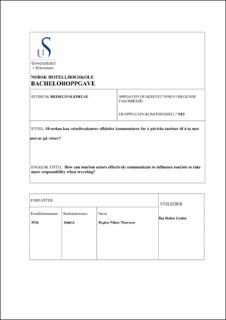| dc.contributor.advisor | Grahn, Åsa Helen | |
| dc.contributor.author | Thoresen, Regine Nilsen | |
| dc.date.accessioned | 2022-07-15T15:52:04Z | |
| dc.date.available | 2022-07-15T15:52:04Z | |
| dc.date.issued | 2022 | |
| dc.identifier | no.uis:inspera:110153871:47131225 | |
| dc.identifier.uri | https://hdl.handle.net/11250/3005824 | |
| dc.description.abstract | Turisters atferd på reiser har stor betydning for utviklingen av bærekrafts målene og 2030 – agendaen. Selv om bærekraft er blitt et stort og viktig tema innen turisme og reiseliv, så er det også nødvendig å positivt utvikle de sosiokulturelle og økonomiske innvirkningene som turister kan ha på det globale samfunnet. Reiselivsaktørene har ansvaret for å kommunisere dette med turister og gi dem muligheter og alternativer som bidrar til en bedre turistatferd og positiv reiselivsutvikling. Dette er dessverre lettere sagt en gjort, og derfor forskes det på følgende problemstilling; «Hvordan kan reiselivsaktører effektivt kommunisere for å påvirke turister til å ta mer ansvar på reiser?». Oppgaven besvarer med hjelp av forskningsspørsmålet; «Hvilken kommunikasjonskanal gir best innvirkning for positiv turist atferd?».
Oppgaven baseres på en integrerende litteraturgjennomgang hvor åtte av tjueni forskningsartikler fra Universitetet i Stavanger sin database Oria ble analysert. Forskningsartiklene er blitt publisert mellom 2014 og 2022 hvor det er like mange kvantitative som kvalitative. Funnene fra forskingsartiklene var nyttig for forskningsspørsmålet og ga svar på studiens problemstilling. Reiselivsaktørenes valg av kommunikasjonskanal hadde flere positive innvirkninger som støttet deler av teoriene, men også funn som ikke samsvarte med teoriene. Det konkludertes med at den ene måten å kommunisere på er mer effektiv og har best innvirkning på positiv turistatferd enn andre. | |
| dc.description.abstract | Tourist behavior in travel is of great importance for the development of the sustainability goals and the 2030 agenda. Although sustainability has become a major and important issue in tourism and tourism, it is also necessary to positively develop the socio-cultural and economic impacts that tourists can have on the global community. The tourism actors are responsible for communicating this with tourists and giving them opportunities and alternatives that contribute to better tourist behavior and positive tourism development. Unfortunately, this is easier said than done, and therefore research is being done on the following issue; "How can tourism actors effectively communicate to influence tourists to take more responsibility when traveling?". The thesis answers with the help of the research question; "Which communication channel has the best impact on positive tourist behavior?".
The thesis is based on an integrative literature review where eight of twenty-nine research articles from the University of Stavanger's database Oria were analyzed. The research articles have been published between 2014 and 2022, where there are as many quantitative as qualitative. The findings from the research articles were useful for the research question and provided answers to the study's problem. The tourism actors' choice of communication channel had several positive impacts that supported parts of the theories, but also findings that did not correspond to the theories. It was concluded that one way of communicating is more effective and has the best impact on positive tourist behavior than others. | |
| dc.language | nob | |
| dc.publisher | uis | |
| dc.title | Hvordan kan reiselivsaktører effektivt kommunisere for å påvirke turister til å ta mer ansvar på reiser? | |
| dc.type | Bachelor thesis | |
